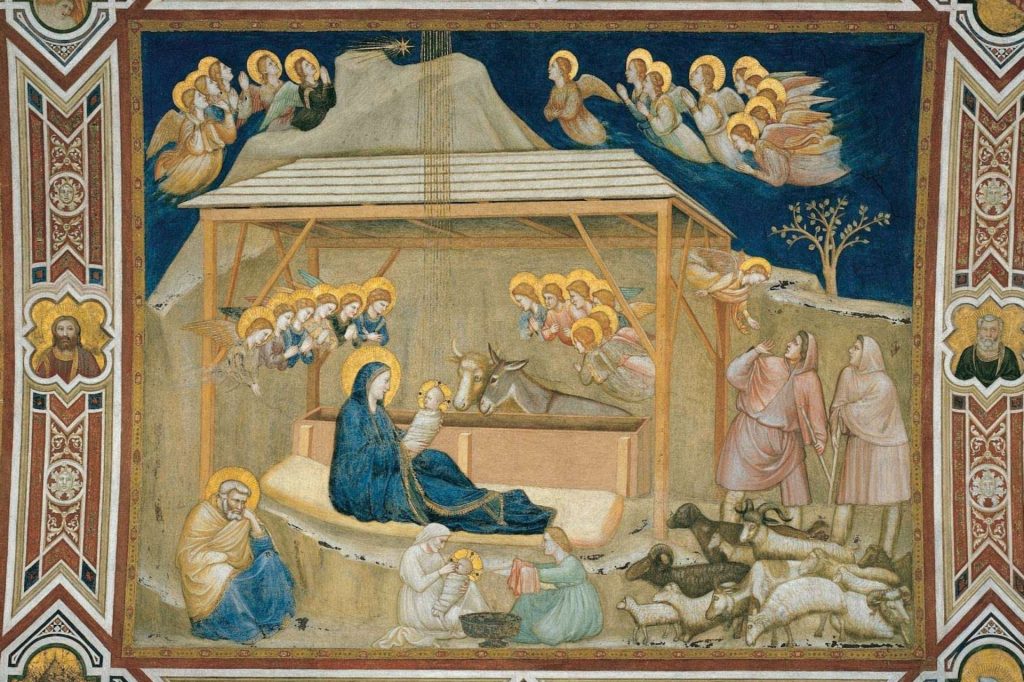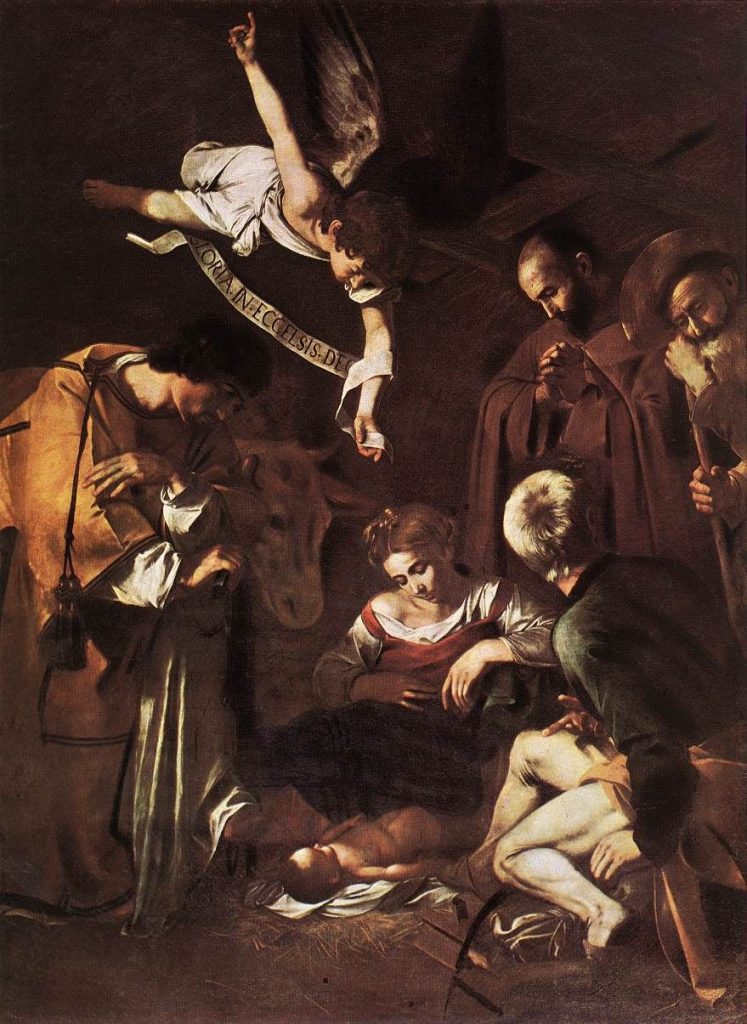
Nativity of Giotto e bottega, 1310, Basilica Inferiore di San Francesco, Assisi
A child is born for us,
a son is given to us.
On his shoulders, authority rests,
and his name will be called:
Wonderful Counselor. (Isaiah 9:5)
Monday, December 25
CHRISTMAS DAY – SOLEMNITY
John 1:1-18
Here we are, after this journey, in front of the cave in Bethlehem! Today, we find the prologue of John illuminating this humble space and helping us understand the mystery. A text that is challenging, at times difficult to comprehend. After all, today’s scene is not easily understandable either: God, in His vastness, chose to divest Himself, take on human nature, and we did not even offer Him a place in the inn!
The prologue introduces us to the protagonist of the gospel: the Word. It is a hymn to the Word, a beautiful poem! What better than poetry to describe beauty, to describe fullness?
In the hymn, the Word is presented in its relationship with God, its relationship with creation, its relationship with history, until the Word becomes flesh, when we see God face to face, as in front of this manger rich in sweetness and mystery. What is the Word? If we think about it, the Word is what gives existence to every person. Without the Word, humanity does not exist, does not relate, does not live.
What is in the beginning is what will also be in the end, what awaits us. In the beginning, or rather, before the beginning, there was no chaos or confusion. In the beginning, there was no action, no fate. In the beginning was “the Word.” The term “Word” comes from “paraballo,” meaning “to throw out.” With the Word, man throws out, exposes himself, offers himself, goes beyond himself. Man is exposed and listened to, corresponding to the Word. God Himself is the Word, freedom, communication, love. Whoever speaks does not say things but says himself if speaking the truth. In fact, when two no longer speak, it’s a disaster. God is Word, is a gift.
Saying that in the beginning was the Word also indicates that in man’s destiny is the Word. However, this Word can be a lie. That’s why Francis, who first intuited the beauty of representing this cave “vividly,” highlights the risk of the Word, a source of lies to praise God, and he prefers using all of creation over using words. Praising God through creation, at least, there is no risk of being hypocritical, false.
According to a Hebrew story about creation, the world was created with the letters of the alphabet: a very intelligent way of saying that the world is intelligible, understandable. That’s why, for some of the Jews, the world is “dominated” by naming things, using words. Everything happens through the Word.

Nativity with St Lorenzo St Francis of Assisi, Caravaggio, 1600, Oratorio di San Lorenzo, Palermo, opera trafugata
God said, creating everything, light, heaven, day, night, waters. When He creates man, He creates the one who can read creation. How we are forgetting this gift of reading creation! If there is beautiful music, and no one listens, that music is not beautiful, it does not even make sense. So, we humans risk treating all the beauty of creation, emptying it of meaning with our indifference.
This Word becomes flesh: it changes the economy of the Word. How does it become flesh? Man lives by the Word, and Jesus lived in His flesh the Word of the Father. When we live the Word of God, it’s as if we begin to live the limit and fragility of our flesh in a divine way, in relationships with others, in relationships with creation, in relationships with the cry of the poor and fragile. In my fragile flesh, I can be a child of God if the Word of God dwells in me. The Bethlehem cave we visited last Sunday is the place that, for the first time, saw this flesh, this new way for all of humanity.
How much light, in front of those shepherds, who today could also be us, there by chance, at night, in everyday work, in the concerns of life! No one has ever seen God, even though we often create Him in our image, as it suits us best. God is Word, the Word is not seen, but it must be understood. The Word is told through life. The Son, with His life, with His flesh, tells us what God is. All the life of Jesus, starting from that cave, is a narration of God. It is an “exegesis,” a “bringing out”; He exposes us, explains to us that man is a child, a brother. That God we all try to imagine as we like best reveals Himself in humanity, as lived by Jesus.
How many beautiful sunsets have we missed, with our eyes on TVs or phones? How many spectacular starry skies! Creation is an objective Word; through the Word, man divinizes, interprets creation, finds meaning, seeks the creator’s signature. Only man performs this task. However, it happens that the light, illuminating the world from this cave, is not welcomed by darkness. In the world, there is fear, a lie that does not grasp the Word. To grasp means to understand, but also to imprison. Darkness cannot understand the light, but it cannot even suffocate it. With this double meaning, value is given to the humility of this cave, to the drama of a God who is born but is not recognized by men.
The most beautiful wish, this Christmas, is to contemplate this Bethlehem scene with the eyes of Saint Clare of Assisi, who said: “Look, on high, at the poverty of Him who was laid in the crib and wrapped in poor swaddling clothes. Oh, marvelous humility and poverty that gives amazement! The King of angels, the Lord of heaven and earth, lies in a manger! See then, in the center of the mirror, holy humility, and together still the blessed poverty, the countless labors and pains that he endured for the redemption of the human race. And below, contemplate the ineffable charity for which he wanted to suffer on the wood of the cross and on it die the most ignominious death. Therefore, it is the same mirror that, from the top of the wood of the cross, directs its voice to passersby, asking them to stop and meditate: O all of you, who pass by on the road, stop to see if there is a pain similar to mine; and we answer, I say to Him who calls and sighs, with one voice and one heart: the memory of You will never be abandoned by me, and my soul will be moved in me” (FF 2904).
In this Word, the destiny of man is played out; in the light of this Word, we can understand all the beauty of what happened in the manger of Bethlehem, and perhaps our Christmas, at the end of this weeks-long search, takes on a sweeter flavor.
We sincerely wish you a Merry Christmas!
Laudato Si’!





